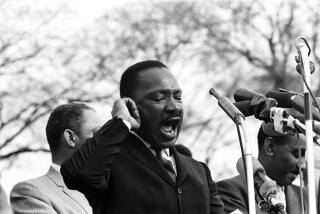How Long, America? How Long? : Dr. King’s searing question still has not been answered
- Share via
In his most famous speech, delivered during the March on Washington in 1963, Dr. Martin Luther King Jr. spoke as a civil rights leader--and as a father: “I have a dream my four little children will one day live in a nation where they will not be judged by the color of their skin but by the content of their character.” Sadly, that day has not yet come in America.
White Americans, in very large numbers, still believe the negative images and stereotypes of African-Americans that were popular when segregation was legal or socially accepted in this nation, if we are to believe a broad national survey conducted in 300 communities by the National Opinion Research Center, which is based at the University of Chicago. The findings are revealing and sobering.
The majority of whites interviewed believe that black Americans and Latinos are “more violence-prone, less hard-working, less intelligent, less likely to be self-supporting and less patriotic than whites,” according to the survey, which was released shortly before this national holiday commemorating King’s birthday.
Black Americans fared the worse in the survey. But Latinos did not fare much better, and at least one-third of the white respondents held similar beliefs about Asian-Americans.
These harmful racist attitudes flourish despite strong federal laws barring racial discrimination in public accommodations, schools, housing, the workplace and the voting booth--and decades of efforts to change the hearts, minds and attitudes of white America.
Patriotism, however, was perhaps the most jarring category given the current ethnic makeup of the U.S. forces in the Persian Gulf. Fifty-one percent of the whites who answered the survey believed that black Americans are less patriotic. An even higher percentage, 61% of the non-Latino respondents, questioned the patriotism of Latinos, who make up 4.5% of the armed forces. And, 55% challenged the patriotism of Asian- Americans, who along with American Indians and other smaller ethnic groups represent 4.2% of the military.
Black Americans make up nearly 21% of the total armed forces, close to double their percentage in the population. In the Army, black soldiers make up 31% of the troops.
The disparity is even more dramatic among the 11% of the troops that are women. Nearly half of the American women in the gulf are black, and other minorities are also very well represented.
Minorities join up at a higher rate because the military provides jobs--and, in most branches, greater opportunities for advancement. The promotion of Gen. Colin L. Powell to chairman of the Joint Chiefs of Staff and his prominent leadership role in the current conflict are certainly strong advertisements for the military.
A disproportionate number of black and Latino soldiers also fought in the Vietnam War. Black soldiers represented 14% of the servicemen during that conflict. An even higher percentage fought and died on the front lines until King, who opposed the war in keeping with his philosophy against violence, protested the disparity.
The very groups who have suffered and died in military battle at such high percentages are the last ones who should have their patriotism questioned. And yet stereotypes fueled by ignorance and indifference hang on.
Stereotypes are powerful enemies of reason and tolerance; the damage they do must not be ignored. The survey showed that those who cling to the negative images also are more inclined to oppose government policies that mandate equality, such as fair housing laws.
As Dr. King asked in frustration decades ago: How long, America? How long?
More to Read
Sign up for Essential California
The most important California stories and recommendations in your inbox every morning.
You may occasionally receive promotional content from the Los Angeles Times.













